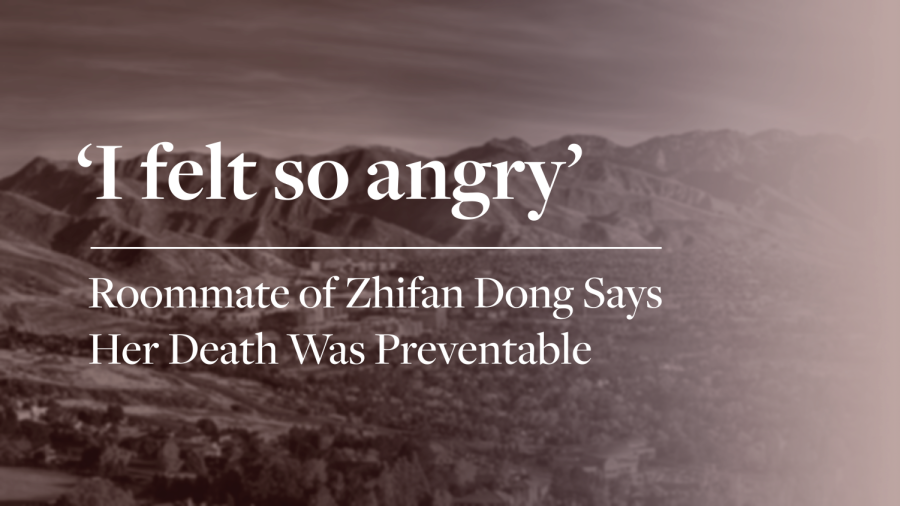‘I felt so angry’: Roommate of Zhifan Dong Says Her Death Was Preventable
(Design by Sydney Stam | The Daily Utah Chronicle)
July 16, 2022
This article discusses domestic violence and murder.
Zhifan Dong, a first-year international student at the University of Utah, was 19 when her boyfriend Haoyu Wang injected her with a fatal dose of heroin and fentanyl in a motel off campus on Feb. 11. According to Bailey McGartland, one of Dong’s roommates at the time, her death took place a little over a month after McGartland helped her file the first of many domestic violence and wellness-check-related reports.
McGartland is a student at the U, a Housing and Residential Education employee and an active philanthropic participant in domestic violence awareness. Throughout the events that surrounded Dong’s death, McGartland said she was involved in the investigation and cooperated with police.
“I felt so angry,” McGartland said. “It was absolutely preventable.”
Fall 2021
McGartland and Dong met in the fall semester of the 2021-22 school year when they were assigned to the same suite in Sage Point, on the U’s upper campus. On the floor above them lived Wang, known on campus as “Chester.”
McGartland explained that Dong and Wang entered into a romantic relationship early on in the semester, and he lived in a single-style room.
“She started living with him right away,” McGartland said.
Early January, 2022
According to McGartland, it was normal to not see much of Dong, as she was living upstairs, not in the suite that they originally shared. It was not until the end of winter break that McGartland became aware of the abuse happening in Dong’s relationship.
“[Wang] did not become abusive until winter break, and very quickly after that incident, Zhifan told me and our roommate at the time how that happened,” McGartland said.
McGartland then explained the first assault against Dong, as it was told to her.
“They were staying off-campus at a hotel, and he physically assaulted her,” McGartland said. “[Dong] fled but she didn’t know [what to do]. She told the person at the hotel what happened, and to call the police.”
McGartland said after a period of not hearing from Wang, Dong filed a report for a wellness check through HRE with McGartland’s assistance.
“We called the UPD non-emergency police line, and we called, eventually, housing and placed a wellness check on him … her English isn’t very good, so I helped place the wellness check on her behalf,” McGartland said.
Jan. 12
Dong called the Salt Lake City Police Department on Jan. 12, reporting the assault. Officers came to McGartland and Dong’s dorm to respond to the call, according to McGartland.
“Police officers ended up coming to our door … and Zhifan pressed charges against Chester,” McGartland said.
Feb. 6
On Feb. 6, roughly three and a half weeks after Dong pressed charges against Wang, McGartland spoke to a friend about her worries, as she had not seen Dong recently and Dong had moved back upstairs into Wang’s dorm room. McGartland’s friend believed she had recently seen them together.
“One of my friends was like ‘Oh, I think I saw them together on campus and she was crying, like he was holding her and not letting her leave,’” McGartland said. “Immediately I was like, that’s not okay, that’s not okay.”
McGartland said she then showed her friend photos of Dong and Wang, after which her friend confirmed it was them that she had seen.
Following this sighting, McGartland’s friend called the non-emergency police line and gave a statement. In addition, McGartland said she filed a report to HRE.
“I went to housing again and I was like, ‘Hey, a wellness check needs to happen on these people, like I’m not sure where Zhifan is, she’s missing,’” McGartland said.
Feb. 8
Two days after reports regarding Dong’s whereabouts and well-being were filed, McGartland said that UPD police officers came to their dorm room.
“They had me call her, which I thought was really odd,” McGartland said.
Digital communication, including texting and video chatting with Dong, was initiated by the UPD during this time in an attempt to confirm her safety and whereabouts, McGartland said.
“There was also no supervisor there,” McGartland said. “I know, because of working in housing, I know that they have to have a supervisor. I knew that [the officers who came into the dorm room] were in the wrong and I was like, this is kind of weird.”
Feb. 11
Three days later, the police received word that Wang sent an email to an employee at the U stating that he had injected Dong with drugs. Dong was found dead the same day at a Quality Inn after a welfare check was performed by the Salt Lake City police, who arrived on the scene after being alerted by the UPD.
McGartland found out about Dong’s death via the email that was sent out to U students that evening.
“My former roommate called me and she was like, ‘Don’t freak out but an email was sent out,’ and that’s how I found out,” McGartland said. “I completely lost it because the email was pretty vague. It just said an international student was killed off campus by a 26-year-old, and I knew Chester was 26.”
After contacting Area Duty, on-call HRE employees, to ask about the situation, McGartland was told that she could not be given information. She was offered a counseling line and no further details.
“It wasn’t for another couple of hours that the university called me to just say that Zhifan had passed away,” McGartland said. “I was like, this is ridiculous. I was so angry.”
Following Feb. 11
McGartland was offered a room change after Dong’s passing, which she accepted. After spending some time at home for a couple of days following the events of Feb. 11, she returned to campus to move her things out of her Sage Point room, but UPD officers were already there.
“There were UPD officers when I was coming back to move out my things … no one informed us that they were going to enter the room … they entered without a warrant too,” McGartland said.
Regarding her involvement with both the campus and city police departments, McGartland said she felt they could have acted sooner.
“The whole contact between UPD and the Salt Lake Police is just very bad,” McGartland said. “It was absolutely preventable. The fact that it was reported and there was a pending assault [from January] against Chester.”
Shawn Wood, communications and community outreach manager at the U, shared in a written statement that communication between the SLCPD and UPD regarding students suspected of a crime is not required by law. This includes students like Wang, who was living on campus when Dong pressed charges against him for domestic violence-related assault.
“Currently, there is no process or regulation requiring local police departments to contact college or universities of arrests or protective orders involving students,” Wood said.
UPD declined to comment on the events surrounding this investigation on the basis of it being ongoing.
Dong was an international student from China and part of the Utah Global program, which university President Taylor Randall mentioned in a written statement about Dong’s death. The program is intended to help “immerse first-year international students in the academic and cultural life of the university.”
Wood explained how Utah Global connects with international students in a written statement, sharing that “a team of four is available to assist student concerns as they arise.”
McGartland felt that Dong was not set up with proper integration into campus as a student from China.
“It’s so hard to see like the Utah Global program … they don’t integrate you into this campus at all,” McGartland said. “Zhifan was isolated from day one. I can clearly see that she was being manipulated from day one. She came here and had no friends, no support.”
As defined by the Utah Domestic Violence Coalition, a 501(c)3 non-for-profit organization, “Abuse is a pattern of behaviors used by one person over another to gain or maintain power and control over another person in a familial or intimate relationship … the fundamental harm of abuse is a loss of autonomy. Autonomy means independence and freedom from external control.”
The UDVC, founded in 1978, provides Utahns with support and resources regarding their specific struggles with domestic violence.
“Some people think domestic violence only means that you live with someone or that you’re married,” said Kimmi Wolf, UDVC’s communications and engagement specialist. “But dating violence is a whole separate category of domestic violence. And that’s just as valid … We just need to normalize talking about it.”
If one knows someone who is in a domestic violence situation, Wolf suggested explicitly communicating support.
“[You could say] ‘I just want to know that with whatever is happening you are comfortable and you feel safe and empowered,’” Wolf said. “As long as you show that support, and that the door is open to this conversation without judgment.”
McGartland hopes that people will recognize Dong for what she was: a victim.
“Having this conversation going forward and getting away from victim-blaming … she was no way in the wrong and she was just taken advantage of,” McGartland said. “This could have been prevented … Zhifan was most definitely a victim.”
r.kloepfer@dailyutahchronicle.com
Editor’s note: If you or someone you know is in a domestic violence situation, the UDVC provides 24-hour hotline support and can connect you to the resources you may need. Their hotline is 1-800-897-5465, and the National Domestic Violence Hotline is 1-800-799-7233.













